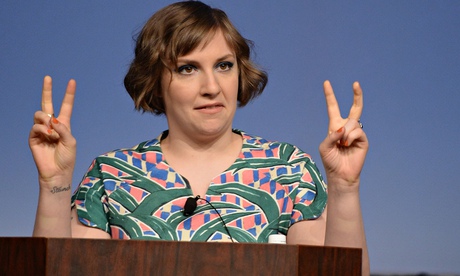
I love Lena’s book (I’m calling her Lena). I just want that out of the way.
Not That Kind of Girl is a memoir in essays crammed with frightful and delightful detail and Lena-ish quips. It is, says Lena, a sort of guide to getting the best out of life. Reading it is an intense experience – more shocking than I was expecting, sadder and more beautiful – anyway; within a few pages I have become Lena’s nanny, her mum, the older sister she never had but would have loved, and her best sensible friend. I’m charmed, anxious, furious and totally committed.
She starts in typical self-deprecating fashion: “I’m already predicting my future shame at thinking I had anything to offer you… I am not a sexpert, a psychologist, or a dietician. I am not a mother of three or the owner of a successful hosiery franchise...”
Lena’s being modest. She was included on Time’s “100 most influential people” list last year (not that we needed Time to spell it out, but there it is). She’s not the mother of three, it’s true, but she is the person who grew chubby from her OCD meds and who, while loathing herself, became a long-term vegan because a cow winked at her, and whose mother wore the kind of straw hat that “makes you want to kill yourself”.
We want to hear from this girl because she came through it all and landed some big gigs. Because if she can, we can; maybe not an HBO comedy series or the $3m-plus advance that the press love to mention, but at least take part in real life and not trip ourselves up repeatedly thinking we don’t deserve it.
Lena’s childhood should have been fine – she’d be the first to admit it – but from tot-age she’s an energetic and opportunistic worrier. Seeing a picture of anorexic girls with their hands folded, she wonders if, at some later date, she might be afflicted in the same way. She needs to see food emerge from its packaging before she can eat it. Her worries multiply and mutate and “the germophobia morphs into hypochondria morphs into sexual anxiety”.
Lena tells us things that are troubling and funny and sometimes unrecoverable-from. In the book, as in real life, her vagina is never far away:
“Mike was the first person to go down on me, after a party to benefit Palestine, on my dorm room rug. I felt like I was being chewed on by a child that wasn’t mine.”
And however much you love Lena (and you do), you feel a bit sorry for the people around her. Some of them anyway. Let’s look at the blokes first. They’re a mix of nice, not nice, very bad and funny. There’s her lovely dad, who has buckteeth and a nihilist streak. There’s the teacher who saves the life of a baby hamster but ends up toying inappropriately (with Lena, not with the hamster), and the bloke who wipes his post-sex dick on the curtains. There’s the one who leaves her broken and scarred inside after an assault she can barely bring herself to remember, and the Puerto Rican bloke called Joe with a tattoo that says “Mom” in Comic Sans.
The women around Lena are less memorable (except the one at the baby clothes shop who works “princess hours”). It’s not a criticism, it’s just that it’s difficult for them to compete with the men, seeing as we don’t hear about them sneakily removing a condom during sex or “punching a girl in the boobs” or shoving Lena’s bundled-up tights into her mouth.
People will compare Not That Kind of Girl to Caitlin Moran’s How to Be a Woman (a book I will love for ever), and I can see why. As guidebooks go, though, it reminds me more of Andy Stanton’s Mr Gum and the Biscuit Billionaire, which begins when a gingerbread man – a likable but lonely biscuit with self-esteem problems – decides to pay people to be his friends. It turns out to be a bad idea. You knew it would, but you’re very glad to see it played out satisfactorily.
Plenty of times you see trouble on the horizon in Not That Kind of Girl – like when Lena practically moves in with a man who organises her wiring but doesn’t show any human emotions – and you know it’s going to end badly. You know why, how and probably when. But when a book is this beautifully written and the ending is happy enough, it’s a pleasure to be reminded.
Nina Stibbe’s Man at the Helm is published by Viking (£12.99)

